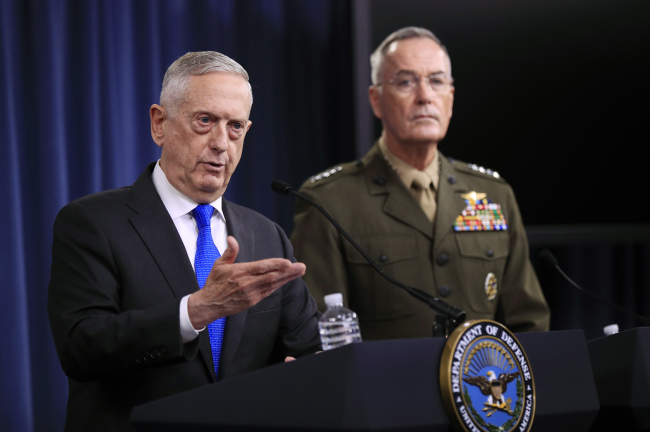August 30, 2018
The US appears to be turning up the heat on North Korea amid stalled denuclearization talks, with US Defense Secretary James Mattis hinting at a resumption of US-South Korea military drills.
As the US reportedly responds to a “belligerent letter” from North Korea by stepping up the pressure, prospects of negotiations between North Korea and the US appear bleak unless the communist state makes a major concession, experts say.
US President Donald Trump suspended the drills while talks with North Korea are underway in “good faith,” following his June 12 summit with North Korean leader Kim Jong-un in Singapore, a decision critics viewed as a premature concession to the North.
“We took the step to suspend several of the largest exercises as a good-faith measure coming out of the Singapore summit,” Mattis told reporters Tuesday. “We have no plans at this time to suspend any more exercises.”
In the wake of the news report, South Korean authorities said Wednesday that they are closely coordinating with the US on the issue.
“For now, South Korea and the US have not discussed the matter,” presidential spokesperson Kim Eui-kyeom told reporters. “It is an issue that should be discussed and decided upon between South Korea and the US while watching progress on North Korea’s denuclearization.”
The US signaled a possible resumption of the military exercises, which North Korea has denounced as “rehearsals for invasion,” after Trump canceled Pompeo’s planned trip to Pyongyang citing “insufficient” progress on denuclearization talks.
US media reported that a “belligerent” letter sent by North Korean senior official Kim Yong-chol to Pompeo, only hours before he was scheduled to leave for Pyongyang with his new special envoy Stephen Biegun, had led Trump to cancel Pompeo’s trip.
In the letter, North Korea warned the US that denuclearization talks are “again at stake and may fall apart” because “the US is still not ready to meet (North Korea’s) expectations in terms of taking a step forward to sign a peace treaty,” CNN reported, citing three unnamed sources.
 |
Follow-up negotiations to the US-North Korea June Singapore summit have shown little progress, with the two countries divided over the sequence of the denuclearization process.
North Korea has demanded that the US declare an end to the 1950-53 Korean War as the first step to building trust in return for the goodwill gestures it has made, while the US has reportedly asked North Korea to hand over an inventory of its nuclear weapons programs first.
While toughening its stance on North Korea, the US also signaled that it is still open to engaging with North Korea.
Pompeo’s spokeswoman, Heather Nauert, cited a statement from Pompeo that said, “America stands ready to engage when it is clear that Chairman Kim stands ready to deliver on the commitments that he made at the Singapore summit with President Trump to completely denuclearize North Korea.”
She also said “there is progress being made” on denuclearization.
The US appears to be seeking to prompt a change in North Korea’s attitude through pressure and appeasement amid a deadlock in their negotiations.
“President Trump canceled Pompeo’s trip, but kept alive a momentum for dialogue. In line with the move, the US is sending a warning to North Korea by hinting at a resumption of the joint military drills,” said Shin Beom-chul, a senior researcher at the Asan Institute for Policy Studies.
“With the momentum for diplomacy still alive, the US would not want to enrage North Korea for now, so it will not immediately resume the military exercises but wait for the North’s action until after the midterm elections in November.”
The US is not likely to make any more concessions until North Korea acts, he said.
“In the worst scenario, North Korea may not make any concession either. The US then resumes the joint military drills with South Korea, and North Korea in response accuses the US of breaking its promise and makes a provocation, which could fuel tensions on the Korean Peninsula.”
North Korea on Wednesday blasted the US for its sanctions against the North, calling it an “outdated confrontation policy” in its state-run newspaper the Rodong Sinmun.
But it has remained silent on Pompeo’s canceled trip to Pyongyang, which experts said may be a sign of the reclusive country’s frustration.
Lim Eul-Chul, professor at Kyungnam University’s Graduate School of North Korean Studies, stressed the role the South Korean government should play in order to break the impasse between the US and North Korea.
“Both the US and North Korea want to see progress, but they cannot make concessions anymore, given their domestic political schedules,” he said, referring to the US midterm elections in November and the 70th anniversary of the founding of North Korea in September. “So it appears to be difficult to advance their negotiations any further.”
“But I think their negotiations could gain speed to some extent if South Korea more actively serves to bridge the gap as a mediator,” he said.
With talks between the US and North Korea in a stalemate, South Korea — which helped broker talks between North Korea and the US — has stressed the need for President Moon Jae-in’s scheduled summit with Kim in Pyongyang next month.
“I believe that the role of the inter-Korean summit has become much greater in solving the problem and overcoming the hurdle as North Korea-US relations are in a deadlock,” presidential spokesperson Kim told reporters.


